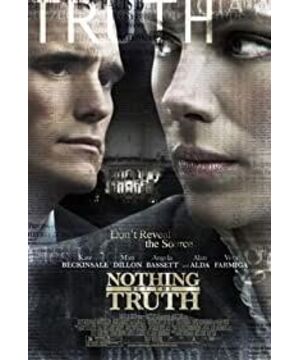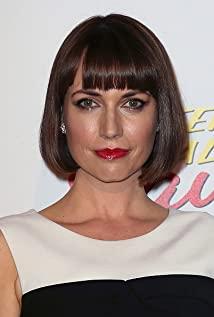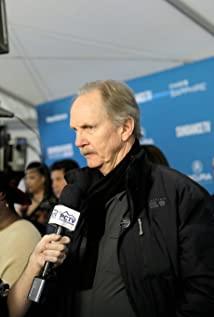The 2008 American film "Truth Matters" tells the story of a reporter who protects news sources, defends press freedom and upholds truth at the expense of personal well-being in front of a powerful state apparatus.
"Capital Sun" female reporter Rachel Armstrong's report exposing the scandal behind the conquest and attack on other countries also revealed the identity of a Central Intelligence Agency (CIA) agent, she believes that the public has a right to know the truth, so she insisted on publishing the report.
Rachel refuses to reveal her source to the government and is imprisoned for leaking state secrets.
As her time in prison continues to lengthen, Rachel's relationship with her husband breaks down, she becomes estranged from her young son, and her family and career collapse.
She was suffering inwardly, but she never disclosed the news informant.
The film, directed by the famous American political thriller director Rod Larry, won the 2008 American Broadcasting Film Critics Association's Best Actress and Supporting Actress Awards, and the 2008 American Women's Film Critics Association's Best Gender Equality Award.
Public First, Truth First - Reporter Rachel
The film progresses layer by layer through a series of tense and conflicting plots and observant details, deepening and expanding Rachel's image as a reporter.
First of all, as a reporter, Rachel has strong professionalism and news sensitivity, capable, sharp and promising.
Her hair was tied high in a ponytail and swayed briskly from side to side as she walked; Rachel worked diligently, whether she was on duty at the newspaper office late at night, or sitting on the kindergarten bus with her son as a "loving mother" , she was always writing and revising on the computer; Rachel took great pains to conduct multiple investigations on government scandals. When facing the special government prosecutor who came to interrogate her, she still had an interview book and a pen in her hand. recorded.
Even when she entered the prison, the first question she asked the guard was "Can I see the morning paper here? "
In the end, Rachel's reporting was nominated for the Pulitzer Prize, the highest award in American journalism, which is the greatest affirmation for her as an excellent reporter.
With the development of the story, the film digs deeper into Rachel's image, depicting the image of a reporter who is not afraid of power and serves the public interest.
The U.S. government launched an attack on Venezuela on the grounds that Venezuela was responsible for the assassination of the U.S. President. After Rachel investigated the scandal, with her own sense of justice, she believed that the public had the right to know the truth and wanted to report and expose the incident.
She paid a huge price for this, but the journalism ideal of "firmly serving as the government's watchdog and returning the truth to the public" has always supported her.
Slant Magazine, a famous American film review website, commented:
"Rachel paid dearly to defend not just the moral code of journalists, but the right of a free citizen to uphold truth over authority."
Rachel excitedly said when she learned that the newspaper would publish her explosive "scraping shit" piece:
" It's like 'Watergate' and 'Iran Continent,' we have to keep the government out of power through objective reporting."
The central topic discussed in the film is Rachel's understanding and defense of upholding the principles of truth and freedom of the press .
In the film, Rachel faces the dilemma that although her report is truthful and objective in exposing the government scandal and letting the public know the truth, the report also exposes the identity of a CIA agent, which in the government's view is a threat to national security , the informant broke the law, so the government asked Rachel to reveal the informant's identity.
However, the media have the right to keep the sources of information secret, especially those related to political scandals in the country, because if reporters do not keep informants secret, then no one will dare to expose wrongdoings, and the media's social monitoring function will be difficult to achieve .
Because of this, Rachel refused to reveal the source, and she believes that any real journalist should be prepared to go to jail for sticking to principles.
This intransigence destroyed her life, even the lives of her loved ones and the CIA agent:
Rachel's husband gradually could not resist the huge pressure of the country, and expressed dissatisfaction with Rachel's insistence on principles and abandoning the family, and eventually the relationship between the two broke down;
Rachel was criticized as an incompetent mother because she went to prison for insisting on principles and could not care for her young son;
The exposed female CIA agent was harassed by the media, and finally died tragically in a right-wing snatch...
As things get darker, keeping sources secret and insisting on a free press, Rachel swears to the death to defend her principles, but at the same time endure the daily torment of her heart.
In the film, the Supreme Court finally takes up Rachel's case, and her lawyer's exposition of truth and freedom of the press and Rachel's spirit in court is called the film 's "pillar of the argument":
“Ms Armstrong could have given up on her promise to go home to be with her family. But if she did, she and her newspaper would never be given any more information. In the future, when we arrest journalists from other newspapers, we will These newspapers have no more sources. So we are ignoring the existence of the First Amendment to the Constitution, and how do we know if the president is hiding his crimes and whether the military officers have committed prisoner abuse?”
Integrity and perseverance, the pursuit of equality - female Rachel
"Truth Matters" was named the 2008 Best Gender Equality Award by the Women's Film Critics Association of America.
While shaping the image of a reporter, the film also successfully shaped an image of an upright and strong woman who pursues equality between men and women.
Rachel's integrity and strength are reflected in her relentless pursuit of the truth, her strict adherence to her commitments, and her unwavering commitment to the public good.
In the film, the U.S. government's attack on Venezuela was a conspiracy, and Rachel launched an investigation. The power of the government penetrated into every corner of society. Rachel encountered a lot of resistance, such as the White House spokesperson's refusal to speak on national security issues. Messages such as comments are blocked.
In the movie, major newspapers like The New York Times are covert in their reports and do not continue to pursue them, but Rachel continues to pursue the truth, and finally collects solid evidence and tells the public the truth through reports.
After she was imprisoned, she accepted a live TV interview. The female anchor assigned by the government asked Rachel to tell her who the informant was after she kept irritating her with her husband and son. Rachel asked back:
"Why would you let a reporter betray his integrity?"
Rachel's lawyer once persuaded Rachel to give up the principle and speak to the informant. He believed that he was upholding Rachel's principles rather than hers. However, when he really understood Rachel, he said in court:
"I realize now that for truly amazing people, there is no difference between people and principles."
The special prosecutor and the judge interrogated Rachel. The lawyer advised her to speak out as an informant. In the end, even her husband who supported Rachel asked her to submit to the government. All of Rachel's jail time stemmed from her firm refusal. Say who the informant is.
The most dramatic and unexpected aspect of the film is the identity of the informant.
After a series of conflicting and conflicting plots, the audience believed that the informant must be an important identity, and it was a big man related to national security that asked Rachel to protect him like this, but the film finally revealed that the so-called "informant" was actually a female agent who went to kindergarten. Daughter, Rachel accidentally learned the identity of the female agent during a conversation with the little girl.
This plot design greatly exaggerated Rachel's integrity and trustworthiness, and brought American-style idealism to the extreme.
With the main line of the film, there is also a "refrain" such as "pursuit of equality between men and women", the American magazine Time Out New York believes that "the director tried to show equality between men and women in the film, and he described two women (Rachel and the female agent). The fight against their respective systems that are skeptical of women's ability to work."
As a woman, Rachel wanted to make her own way in journalism, and she struggled more than men to balance work and family.
When Rachel's lawyer persuaded Rachel to reveal her news source to leave prison on the grounds that she wanted to take care of her son, Rachel's words were very feminist:
"A man who left his family and went to prison in order to uphold his principles, people used his name as a holiday name. Now a woman does the same and she's a monster. What if I make concessions? 'Don't trust journalists who are mothers because mothers end up giving up on principles and compromising'?"
Director Larry is good at portraying female characters like Rachel. They always fight fiercely against external pressures and inner conflicts at the expense of personal interests in order to defend their principles in the face of adversity. It shows the greatness and strength of women, and is full of a strong sense of equality between men and women.
Small self is big self, pain and helplessness - mother Rachel
Rachel is full of love for her young son, but her job as a reporter often leaves her with little time to spend with him.
After Rachel was imprisoned for reporting, this potential emotional estrangement between mother and son gradually deepened, which brought great pain to Rachel and made the audience sigh.
The film depicts the enormous dilemma that characters face in adhering to personal principles and harmony in family relationships.
Several major details in the film show the development of the mother-child relationship.
At the beginning of the film, Rachel was busy writing reports and seemed impatient with her son's playfulness and shouting. She asked her son to sing with everyone quietly, while her son Timmy was unhappy, which showed a mother Busy work scene.
In the second set of shots, Rachel rushed to report at the newspaper late at night. Timmy called to ask her if she had read his composition, and she was going to bed. Rachel assured her son that she would comment the next morning.
The mother and son had a very sweet conversation in the kitchen the next morning, with Rachel feeling guilty and making up for Timmy.
On the way to send Timmy to school, Rachel was still busy listening to the news on the radio. Timmy wanted to play at the zoo, but she perfunctory did not agree.
After Rachel was imprisoned, Timmy came to visit the prison. Rachel pretended to be very relaxed and comforted Timmy that he would be fine, but Timmy was silent, his eyes were full of loss and fear.
At the end of the film, when Rachel was finally imprisoned for two years for contempt of court, her only request was to meet her son again. Facing the unfamiliar and unfamiliar son, she suppressed the sadness in her heart and the hope in her eyes. Tears made his son laugh and said to his son:
"You can pretend you don't love me, and I can pretend to believe it, but I love you and I miss you every second."
In the end, the mother and son separated in two directions, and Rachel turned back and reluctantly left her son.
"Pianfeng Magazine" pointed out:
"Beckinsale plays Rachel's steadfastness, but at the same time conveys the character's fear and despair as she struggles to stay connected with her son and the outside world. It's this vulnerability and inner conviction that wins audiences over the character. Approved."
Through the strong portrayal and superposition of three different roles of Rachel reporter, women and mother, the film creates an upright and unswerving female reporter who defends her principles and endures the great pain and sacrifice brought by this risk alone. image.
The superposition of the triple identities on Rachel has comprehensively shaped the character image of the central character, highlighted her great quality and spirit, and promoted the continuous deepening and expansion of the film's theme.
Twelve years later, the world is being ravaged by the virus. Due to the political and ideological conflicts caused by the outbreak of the epidemic, should individual American media and journalists review this book during home isolation? American movies more than ten years ago, learn and feel from Rachel's body, what is the real objective report and adhere to the principle of truth first for journalists?
View more about Nothing But the Truth reviews










